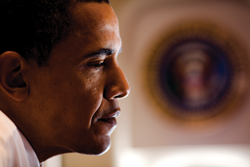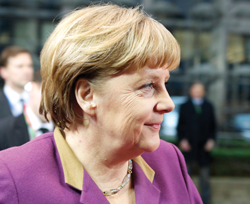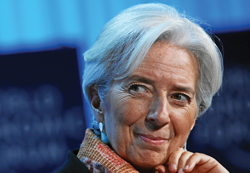An economic overview
Some signs of hope stand out while the global economy slows. Peter Cheney summarises key trends in overall economic performance on both sides of the Atlantic and in the wider world.
USA: cautious recovery
 Strong growth in private sector job numbers since last September (including a 233,000 gain in February) has boosted Barack Obama’s re-election chances but America’s recovery remains tentative. For context, a 300,000 monthly gain represents a real boom in jobs while 125,000 is the baseline, just enough to keep up with population growth. 31,000 of those new jobs were in manufacturing, 429,000 of those posts have been created in the last two years, making up for around a quarter of losses during the recession.
Strong growth in private sector job numbers since last September (including a 233,000 gain in February) has boosted Barack Obama’s re-election chances but America’s recovery remains tentative. For context, a 300,000 monthly gain represents a real boom in jobs while 125,000 is the baseline, just enough to keep up with population growth. 31,000 of those new jobs were in manufacturing, 429,000 of those posts have been created in the last two years, making up for around a quarter of losses during the recession.
The unemployment rate remains steady at 8.3 per cent: 12.8 million people. Overall prices inflated by 2.9 per cent between January 2011 and January 2012.
Most economic forecasters predict slower jobs growth over the year due to lower than expected GDP growth.A prediction of 2 per cent annual growth by Barclays Capital has been reduced to 1.8 per cent, thus concurring with the IMF’s figure.
The US trade deficit grew by 4.3 per cent between December and January to reach $52.6 billion i.e. a new record of $233.4 billion in imports minus $180.8 billion in exports. Import growth over that month increased by 2.1 per cent, exceeding the 1.4 per cent rise in exports.
Europe-bound goods fell from £28.7 billion in December to £26.3 billion in January, an indication of how the continent’s fiscal troubles are impacting the US economy. The decrease in exports to the Pacific Rim, though, is more pronounced: down from £32.2 billion to
£28.4 billion.
Deficit-widening factors have included rising oil prices (increasing the cost of those imports by 3.3 per cent) and higher demand for foreign cars, computers and foodstuffs. Goods exports to Ireland totalled $602 million in January ($770 million in December) while imports stood at $2.89 billion (previously $3.62 billion). Obama returned to soaring oratory when he met Rolls Royce workers at Petersburg, Virginia. “Better days” lay ahead: “We’ve got the tools, we’ve got the know-how, we’ve got the toughness to overcome any obstacle.” Mitt Romney points to his business career, saying: “Our country badly needs a turnaround.” Expect more of the same election rhetoric but not necessarily the matching economic reality as November approaches.
Europe: Compact targets debt
 Four numbers matter when discussing the European fiscal compact. The EU has 27 member states. Twenty-five EU heads of government have signed the compact (minus the UK and Czech Republic). It aims to control the debts of the 17 euro zone countries. Finally, it must be ratified by 12 member states.
Four numbers matter when discussing the European fiscal compact. The EU has 27 member states. Twenty-five EU heads of government have signed the compact (minus the UK and Czech Republic). It aims to control the debts of the 17 euro zone countries. Finally, it must be ratified by 12 member states.
EU industrial production experienced no increases last quarter and fell by 1.8 per cent in December. Employment growth staggered between a 0.4 per cent increase and 0.1 per cent fall over 2011. Unemployment in January stood at 10.1 per cent, a rise from 9.8 per cent in September, and increases to 22.4 per cent for 15-24 year olds.
The second Greek bail-out, costing €130 billion, has been signed off by euro zone finance ministers, in the latest attempt to stave off contagion. François Hollande has pledged to renegotiate the fiscal compact if elected as French President, although his hands will be tied by the existing intergovernmental consensus.
Euro area inflation for February was estimated at 2.7 per cent, up from 2.6 per cent in January. EU GDP grew by 1.5 per cent in 2011 and is expected (by Commission statisticians) to fall to 0.0 per cent in 2012 before returning to the 2011 level next year. The EU’s trade deficit with the rest of the world, for 2010, stood at €159.9 billion while the deficit with China was €169.3 billion.
Angela Merkel views the compact as a “great leap” towards greater stability and closer union. It should help to reassure German tax-payers that future bail-outs can be avoided. The next German general election is due in the autumn of 2013.
Herman Van Rompuy was re-elected as European Council President on 1 March (his term ends in November 2014) and will now formally chair euro zone summits. David Cameron’s political backing for Enda Kenny will be even more important if Irish voters reject the compact. UK-Irish trade totalled €28.6 billion in 2010.
Ideologically, the European Council is dominated by centre-right heads of government: 16 from the European People’s Party and two (UK and Czech) from the anti-federalist European Conservatives and Reformists. The remainder comprise five socialists, two liberals and three independents, including appointees Mario Monti and Lucas Papademos.
World: Lagarde sees hope
 “Global growth prospects dimmed and risks sharply escalated during the fourth quarter of 2011,” according to the IMF’s January 2012 World Economic Outlook update. Speaking in Berlin, IMF Managing Director Christine Lagarde emphasised that 2012 “must be a year of healing” for the global economy. Otherwise, the world “could easily slide into a ‘1930s moment’ … where trust and co-operation break down and countries turn inward.” The “ever hopeful” Ms Lagarde set out three imperatives for a euro area recovery: stronger growth, larger firewalls and deeper fiscal integration.
“Global growth prospects dimmed and risks sharply escalated during the fourth quarter of 2011,” according to the IMF’s January 2012 World Economic Outlook update. Speaking in Berlin, IMF Managing Director Christine Lagarde emphasised that 2012 “must be a year of healing” for the global economy. Otherwise, the world “could easily slide into a ‘1930s moment’ … where trust and co-operation break down and countries turn inward.” The “ever hopeful” Ms Lagarde set out three imperatives for a euro area recovery: stronger growth, larger firewalls and deeper fiscal integration.
World output rose by 3.8 per cent in 2011 and is expected to fall to 3.3 per cent this year, before rising again to 3.9 per cent in 2013. China’s 9.2 per cent growth in 2011 would drop to 8.2 per cent in 2012, and then recover to 8.8 per cent. India’s predicted pattern is 7.4 to 7.0 to 7.3 over 2011-2013. Russia, Brazil and South Africa are expected to experience modest percentage growth this year: 3.3, 3.0 and 2.5 respectively. The International Labour Organisation estimates that 197 million people were unemployed in 2011 (6.2 per cent), although labour market statistics are highly unreliable in developing countries. Inflation is expected to fall from 2.7 to 1.6 per cent in advanced economics, and from 7.2 to 6.2 per cent elsewhere, between 2011 and 2012.
World Bank President Robert Zoellick launched its China 2030 report on 27 February, which suggested six strategic economic priorities for the country: completing the transition to a market economy; accelerating the pace of open innovation; green growth; expanding job opportunities and public services for all citizens; modernising and strengthening domestic banking; and connecting structural reforms to the changing international economy.






